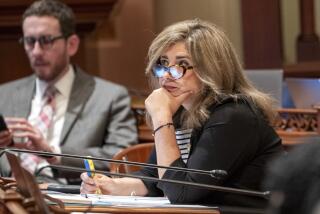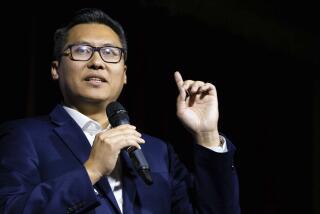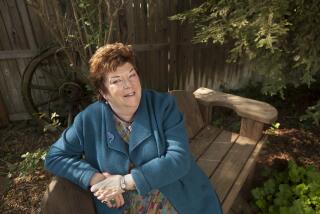Sen. William Campbell dies at 79; longtime state lawmaker
Former state Sen. William Campbell, a moderate Republican from Hacienda Heights whose affable style won allies on both sides of the political aisle during his two decades in the Legislature, has died. He was 79.
The former Senate Republican leader, who had diabetes and heart problems, died in his sleep Sunday at his home in Orem, Utah, said his wife, Margene.
The Pennsylvania native began his political career in 1966, when he won an uphill race for the state Assembly in a heavily Democratic district that included La Puente, South Whittier and Pico Rivera.
He served four terms in the Assembly — interrupted by an unsuccessful bid for the Los Angeles County Board of Supervisors in 1972 — before moving to the Senate in 1976. He was minority leader for four years before leaving the Senate in 1990.
He made his most lasting contribution in the mid-1970s, when he led a joint legislative committee to streamline the state’s response to wildfires, earthquakes and other disasters. The committee became a source of major legislation on disaster preparedness and statewide coordination of emergency services, said Jerry Haleva, Campbell’s longtime top aide.
Until the joint committee began examining the issues, “no one really paid attention to the first-responder community,” Haleva said Tuesday. “Now, when people in the L.A. Basin are experiencing a wildfire and see a firetruck in their driveway from Eureka, it’s because of a system Sen. Campbell put in place.”
The Sacramento building that houses the California Emergency Management Agency is named after Campbell.
In 2003, more than a decade after he left office, he was chosen by outgoing Democratic Gov. Gray Davis and incoming Republican Gov. Arnold Schwarzenegger to head a blue-ribbon commission on the state’s response to the wildfires that ravaged Southern California that year.
The panel’s report led to legislation in several key areas, including construction standards, timber harvesting and vegetation overgrowth in fire-prone areas.
Colleagues said they remembered Campbell most for the political skills that helped keep the wheels of lawmaking turning.
“His accomplishment was getting people to work together. He had a great personality even when he was being partisan,” former Senate Democratic leader David A. Roberti said Tuesday. “You had to laugh. He did it in a friendly way.”
Roberti recalled that Campbell once donned a suit of armor to express his dismay with his Democratic counterparts. “He made all the papers, and he made his point. He was mad at us,” said Roberti, who no longer remembered the specifics of the dispute. “He could play hardball, but you never could stay mad at him long.”
His bipartisan tilt made many Republican colleagues unhappy. “Some of them thought his friendship with the other side was somehow undermining his purity as a conservative,” Haleva said. “To be very honest, sometimes that other camp was not enjoyable company for the senator.”
So in 1983, when Campbell arranged to fly Senate Republicans to Los Angeles to attend a dinner for President Reagan, he assigned his most inflexible colleagues to a separate plane. During that flight they circulated a petition that resulted in Campbell’s ouster as minority leader.
Campbell was born July 24, 1935, in Coraopolis, Pa. He attended Westminster College in New Wilmington, Pa., before joining the Army and serving in the 101st Airborne Division in the mid-1950s. Later he attended Columbia University in New York but left before earning a degree to join his parents in California in 1959.
While working as an administrative assistant for the old Hudson Elementary School District in Hacienda Heights, where his mother was a teacher, he became involved in political campaigns. He ran his first race for the state Assembly in 1964 and lost. After he was elected in the Republican landslide that brought Ronald Reagan into the governor’s office, in 1966, Campbell often joked that “Ronald Reagan became governor on my coattails.”
During his two decades as a lawmaker, Campbell was not without his critics.
Political opponents chastised Campbell for benefiting financially from an annual women’s conference he sponsored in the 1980s. Partly subsidized by the Small Business Administration, it paid $365,000 to a consulting firm owned by Campbell’s wife and one of his aides. Campbell acknowledged that he profited indirectly from the arrangement but said he saw nothing wrong with it.
In 1989, a Los Angeles Times report concluded that Campbell was one of the Senate’s most infrequent voters for missing 30% of the votes he could have cast on legislation during the previous three years. Campbell defended his record, maintaining that he was present for important votes.
Other activities often took him away from Sacramento. He was president of the Los Angeles Coliseum Commission during the 1984 Olympic Games and headed the negotiating committees that brought the Raiders and the Clippers to Los Angeles.
In 1986, he ran for statewide office, losing the controller’s race to future Gov. Davis. In 1987, he was named California co-chair of then-Vice President George H.W. Bush’s presidential campaign.
In late 1989, he announced that he was leaving the Senate to become president of the California Manufacturers & Technology Assn. He lobbied for that group until health problems led him to retire in the late 1990s. A Mormon, he later moved to Utah.
Besides his wife of more than 50 years, his survivors include two daughters, Michelle Warnick of Laguna Niguel and Stephanie Jones of Highland, Utah; a sister, Shirley J. Campbell, of Woodbury, Conn.; a brother, Clifford Campbell, of Allison Park, Pa.; 14 grandchildren and five great-grandchildren.
Twitter: @ewooLATimes
More to Read
Start your day right
Sign up for Essential California for the L.A. Times biggest news, features and recommendations in your inbox six days a week.
You may occasionally receive promotional content from the Los Angeles Times.







